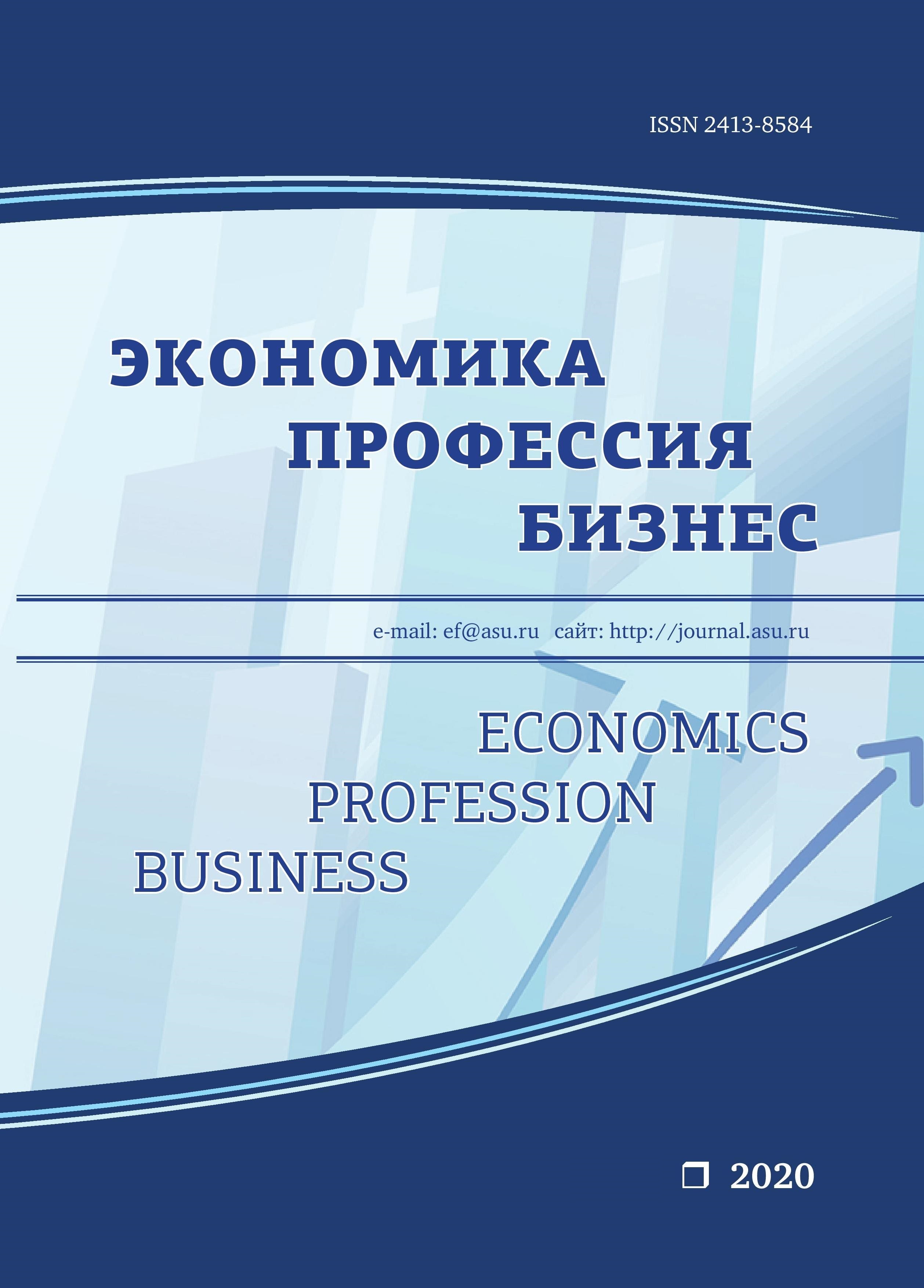ASSESSMENT OF REGIONAL INTELLECTUAL CAPITAL AND ITS CORRELATION WITH THE LEVEL OF ECONOMIC DEVELOPMENT OF THE ALTAI REGION AND THE SIBERIAN FEDERAL DISTRICT
УДК 330.3 (571.1./.5)
Abstract
The article discusses and comparatively analyses the dynamics of the level of intellectual capital and indicators of economic development of the Altai Region and the regions of the Siberian Federal District based on the author’s approach to the assessment of intellectual capital as a factor of economic development. A decrease in the competitiveness of the Altai Region in the field of education, research and development, innovation activity across the Russian Federation and the Siberian Federal District was found. Criteria of the effective transformation of regional intellectual potential into regional intellectual capital and regional innovation activity, as well as criteria of the effective use of intellectual capital as a factor of regional economic development are proposed. The deferred (time lag) effects of the impact of intellectual capital on the economic development of the regions of the Siberian Federal District are evaluated.
Downloads
Metrics
References
Аганбегян А. Г. Человеческий капитал и его главная составляющая — сфера «экономики знаний» как основной источник экономического роста // Экономические стратегии. 2017. № 3. С. 66-79.
Березовская А. Г., Корицкий А. В. Оценка влияния человеческого капитала на объемы производства ВРП в регионах России // Мир экономики и управления. 2018. Т. 18, № 3. С. 42-54.
Schiuma G., Lerro A. Knowledge-based capital in building regional innovation capacity // Journal of Knowledge Management. 2008. Vol. 12, № 5. Pp. 121-136.
Сердюкова Л. О. Развитие инновационных систем на мезоуровне как ключевой фактор формирования и использования интеллектуального капитала // Актуальные проблемы экономики и права. 2012. № 4 (24). С. 180-186.
Унтура Г. А. Оценка влияния человеческого капитала на экономический рост российских регионов в условиях финансовых ограничений // Пространственная экономика. 2019. Т. 15, № 1. С. 107-131.
Официальный сайт Федеральной службы государственной статистики. URL: https://www.gks.ru/folder/210/document/13204 (дата обращения: 10.05.2020).
Об утверждении стратегии социально-экономического развития Алтайского края до 2025 г.: закон Алтайского края от 21 ноября 2012 года № 86-ЗС. URL: http://www.econom22.ru/upload/iblock/f3c/Zakon86-zs_121121.pdf (дата обращения: 10.05.2020).
Дубина И. Н., Остащенко Т. В. Оценка интеллектуального капитала региона: задачи, методы, инструменты // Экономика и управление: проблемы, решения. 2016. № 4. С. 140-149.
Остащенко Т. В. Оценка интеллектуального капитала как фактора экономического развития региона: автореф. дис. ... канд. эконом. наук. Барнаул, 2019. 26 с.
Остащенко Т. В. Оценка влияния интеллектуально-инновационной активности на социально-экономическое развитие регионов // Вопросы региональной экономики. 2019. № 1 (38). С. 95-102.
REFERENCES
Aganbegyan A. G. Human capital and its main component — the sphere of the “knowledge economy” as the main source of economic growth // Economic strategies. 2017. № 3. Pp. 66-79.
Berezovskaya A. G., Koritsky A. V. Assessment of the impact of workers’ education in the regions of Russia on volumes of production of gross regional product // World of Economics and Management. 2018. Vol. 18, № 3. Pp. 42-54.
Schiuma G., Lerro A. Knowledge-based capital in building regional innovation capacity // Journal of Knowledge Management. 2008. Vol. 12, № 5. Pp. 121-136.
Serdyukova L. O. Development of innovative systems at meso-level as a key factor of forming and utilization of intellectual capital // Actual problems of economics and law. 2012. № 4 (24). Pp. 180-186.
Untura G. A. Estimation of Human Capital influence on economic Growth in Russian Regions under conditions of financial shortage // Spatial economics. 2019. Vol. 15, № 1. Pp. 107-131.
Official site of the Federal State Statistics Service. URL: https://www.gks.ru/folder/210/document/13204 (date of access: 10.05.2020).
Strategy of socio-economic development of the Altai Territory until 2025. URL: http://www.econom22.ru/upload/iblock/f3c/Zakon86-zs_121121.pdf (date of access: 10.05.2020).
Dubina I. N., Ostashchenko T. V. Assessment of regional intellectual capital: objectives, methods and instruments // Economics and Management: problems, solutions. 2016. № 4. Pp. 140-149.
Ostashchenko T. V. Assessment of intellectual capital as a factor of regional economic development: author. dis. ... cand. econ. sciences. Barnaul, 2019. 26 p.
Ostashchenko T. V. Assessment of the impact of intellectual and innovation activities on regional socioeconomic development // Questions of the regional economy. 2019. № 1 (38). Pp. 95-102.
Economics Profession Business is a golden publisher, as we allow self-archiving, but most importantly we are fully transparent about your rights.
Authors may present and discuss their findings ahead of publication: at biological or scientific conferences, on preprint servers, in public databases, and in blogs, wikis, tweets, and other informal communication channels.
Economics Profession Business (EPB) allows authors to deposit manuscripts (currently under review or those for intended submission to EPB) in non-commercial, pre-print servers such as ArXiv.
Authors who publish with this journal agree to the following terms:
- Authors retain copyright and grant the journal right of first publication with the work simultaneously licensed under a Creative Commons Attribution License that allows others to share the work with an acknowledgement of the work's authorship and initial publication in this journal.
- Authors are able to enter into separate, additional contractual arrangements for the non-exclusive distribution of the journal's published version of the work (e.g., post it to an institutional repository or publish it in a book), with an acknowledgement of its initial publication in this journal.
- Authors are permitted and encouraged to post their work online (e.g., in institutional repositories or on their website) prior to and during the submission process, as it can lead to productive exchanges, as well as earlier and greater citation of published work (See The Effect of Open Access).









